
Culture
In these early days of Advent, when we are immersing ourselves in biblical narratives, we can easily forget that nothing we read in Scripture is there by accident...

Scalia
''After the man, Adam, had eaten of the tree, the Lord God called to the man and asked him, 'Where are you?' He answered, 'I heard you in the garden; but I was afraid, because I was naked, so I hid myself.' Then he asked, 'Who told you that you were naked'" (Gn 3:8-11)?
In these early days of Advent, when we are immersing ourselves in biblical narratives, we can easily forget that nothing we read in Scripture is there by accident -- that even a seemingly inconsequential detail (like the fact that the Prodigal Son was still "a long way off" when the Father ran out to meet him) is an invitation to ponder God's greatness, as well as his strange humility.
Indeed, humility. What kind of God runs out to meet the trudging, imperfectly penitent prodigal? What sort of Maker, choosing to Incarnate, first seeks out the consent of the creature whose grace and flesh he requires? A humble one.
And, what sort of Creator (who, being omnipresent, never needs to ask us a thing) nevertheless inquires of the man, Adam, "Who told you that you were naked?"
Clearly, when God sends an angel to ask for a virgin's fiat, he is seeking a real agreement of cooperation with his most beloved of creatures. But his question to Adam is different, and we linger on it, wondering, "What God is doing, here? Is he shaming Adam and Eve for being naked?"
No, he is not. "Who told you that you were naked," is not a trick or a test. As with all of God's questions, it is a summons for his creatures to behold, consider and better understand ourselves and why we do the stupid things we do.
Animals do not perceive nakedness; they don't feel afraid and hide because of it. But, whether through evolution or fruit, suddenly Adam and Eve were feeling vulnerable, and scared.
They were hiding, but why?
Maybe it was because they felt exposed in a way that had nothing to do with nakedness. Perhaps what really frightened them was their first, very shallow experience of self-awareness, the understanding that they possessed not only instinct but reason and free will. And uh-oh! They came by that understanding because they'd discussed and reasoned themselves into disobedience.
And, uh-oh! Now they were answerable, and to someone beyond themselves, for their action.
And what an action it was, full of pride and willful illusion -- in this case, of being God's equal. And, wouldn't you know it -- pride, self-satisfaction and the lies that serve both are still our abiding sins. We self-aggrandize. We lord ideas, which are mostly illusion (and often idols), over each other.
And we lie to ourselves and everyone else about it, and have since Eden.
Still, are we supposed to believe that a humble and understanding God was so insecure he couldn't deal with his stupid creatures wanting to be like their Father, and that's why he threw them out of Paradise?
Again, I don't think so. God made humanity in his own image; he understands curiosity; he understands the vastness of the human mind and the way the human (non-God) elements of reason and will can challenge and warp even the best of us.
I wonder if Adam and Eve lost Eden not because they disobeyed but because afterward they hid themselves. Unable to believe that they could trust God in their new understanding of vulnerability, they went into the shadows and willfully separated themselves from God's company.
Perhaps the inability to seek out and trust in God's merciful goodness when we feel vulnerable is the true taint and effect of Original Sin: God has been trying to get us to trust Him, to reveal ourselves to Him ever since.
Just as vulnerability and openness are required in our human relationships, they are necessary to growing in a real relationship with God.
In Advent, as we plead for Emmanuel to come to us, I like to remember the plea God makes to us -- to return to him, like the Prodigal. To consent to him, like Mary. To be aware and thus vulnerable: "Ephphatha! Be opened."
In season, we sing, "O come, O come, Emmanuel." Forever, God sings, "Come ... Let me see your face, let me hear your voice..."
More than a call-and-response, it is the sweetest song in the world.
- Elizabeth Scalia is culture editor for OSV News.
Recent articles in the Culture & Events section
-
The call of Pope Francis' final Easter messageMichael Reardon
-
The best of Francis: Five unforgettable momentsElizabeth Scalia
-
Scripture Reflection for April 27, 2025, Sunday of Divine MercyDeacon Greg Kandra
-
Dr. King's visit to Boston and St. John's Seminary 60 years agoViolet Hurst
-
The honor of caring for our priestsKate Marshall























